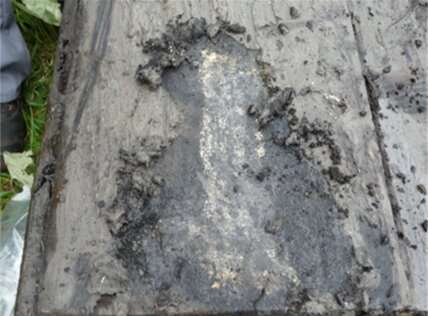The biofilm on iron sheet piles. Credit: Radboud University
A natural biofilm of oxygen-free microorganisms protects iron sheet piling against corrosion by depositing minerals on the wall. That is what researchers at the Radboud University, the Dutch Institute of Ecology (NIOO-KNAW) and Deltares have published in Applied and Environmental Microbiology.
Iron sheet piling has an estimated life expectancy of 50 to 100 years. However, at several locations in the Netherlands, sheet piling has already been damaged by corrosion to such an extent that the sheets are only one millimetre thick. Replacement of these weak sheet piles costs millions, if not billions, of euros.
At the same time though, there are also places where the sheet piling is still in excellent condition. It appears that a natural protective layer has formed on the sheet piling, a biofilm consisting of minerals and anaerobic microorganisms.
Biofilm examined more closely
The microbiologists examined the biofilm on the sheet piling in Gouderak, in the Dutch province of Zuid-Holland. Using modern DNA sequencing methods, they identified the microorganisms that were present in the biofilm. Four types of oxygen-free or anaerobic microorganisms were found in the biofilm, including methane-producing microbes.
But what these microorganisms did exactly, remained unclear. That is why Michiel in 't Zandt started researching the existing literature. "We know that when iron comes into contact with water, slight corrosion occurs. During this process, hydrogen is formed. We now think that the methane-producing microorganisms use iron and hydrogen to convert carbon dioxide, CO2, into methane. And CO2 largely determines the acidity of the sediment. If the CO2 level lowers, the sediment becomes more alkaline. As a result, minerals precipitate, and the protective layer is created," in 't Zandt explains.
The biofilm protects, but how?
It remains largely unclear how the biofilm provides protection. "Because some microorganisms eat iron, as can be observed in the Titanic shipwreck, you would expect holes to be created in the sheet piling. We are in the dark as to why this biofilm protects the sheet piling," explains microbiologist Michiel in 't Zandt. Further research should, therefore, determine whether the biofilm can be produced to protect iron sheet piles from corrosion in other places as well.
Normally, when methane is in the news, it is mostly negative, since it contributes to global warming. "This research shows a positive side of methane-producing microorganisms. They can help us protect our canals," says in 't Zandt.
More information: Michiel H. in 't Zandt et al. High abundance of Methanobacteriales and Syntrophobacterales may help to prevent corrosion of metal sheet piles, Applied and Environmental Microbiology (2019). DOI: 10.1128/AEM.01369-19
Journal information: Applied and Environmental Microbiology
Provided by Radboud University





















